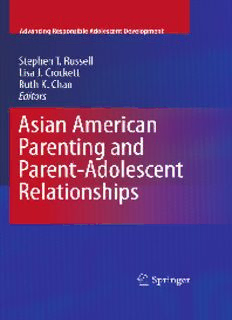
Asian American Parenting and Parent-Adolescent Relationships PDF
Preview Asian American Parenting and Parent-Adolescent Relationships
Advancing Responsible Adolescent Development SeriesEditor RogerJ.R.Levesque IndianaUniversity,Bloomington,IN,U.S.A Forfurthervolumes: http://www.springer.com/series/7284 · · Stephen T. Russell Lisa J. Crockett Ruth K. Chao Editors Asian American Parenting and Parent-Adolescent Relationships 123 Editors StephenT.Russell LisaJ.Crockett NortonSchoolofFamily DepartmentofPsychology andConsumerSciences UniversityofNebraska-Lincoln UniversityofArizona Lincoln,NE68588 Tucson,AZ85721 [email protected] [email protected] RuthK.Chao DepartmentofPsychology UniversityofCalifornia,Riverside Riverside,CA92521 [email protected] ISBN978-1-4419-5727-6 e-ISBN978-1-4419-5728-3 DOI10.1007/978-1-4419-5728-3 SpringerNewYorkDordrechtHeidelbergLondon LibraryofCongressControlNumber:2010920316 ©SpringerScience+BusinessMedia,LLC2010 Allrightsreserved.Thisworkmaynotbetranslatedorcopiedinwholeorinpartwithoutthewritten permission of the publisher (Springer Science+Business Media, LLC, 233 Spring Street, New York, NY10013,USA),exceptforbriefexcerptsinconnectionwithreviewsorscholarlyanalysis.Usein connectionwithanyformofinformationstorageandretrieval,electronicadaptation,computersoftware, orbysimilarordissimilarmethodologynowknownorhereafterdevelopedisforbidden. Theuseinthispublicationoftradenames,trademarks,servicemarks,andsimilarterms,eveniftheyare notidentifiedassuch,isnottobetakenasanexpressionofopinionastowhetherornottheyaresubject toproprietaryrights. Printedonacid-freepaper SpringerispartofSpringerScience+BusinessMedia(www.springer.com) Preface Therelationshipsbetweenchildrenandtheirparentsarethebuildingblocksforfam- ilyrelationshipsthroughoutlife.Thenatureoftheparent-childrelationshipbegins withparenting—thepracticesandstrategiesthatparentsengageinastheyraisetheir children. Parenting during childhood sets the stage for parent-adolescent relation- ships. These relationships make a critical difference during the teenage years: we knowthatwhenparent-adolescentrelationshipsarehealthyandstrong,adolescents are more likely to have high aspirations and achievement, and to make healthier choiceswhenitcomestorisk-taking. MostoftheresearchinthisfieldhasbeenbasedintheUnitedStatesandhasbeen conducted throughstudiesofEuropean Americanfamilies.Yetagrowingbodyof researchsuggestsimportantethnicdifferencesinstylesofparentingandthequali- tiescharacterizingtheparent-adolescentrelationship.Inthisareaofresearch,most existing studies have examined ethnic and cultural group differences using widely accepted measures and concepts of parenting. Comparative studies assume that dimensionsofparentingsuchasparentalwarmthorcontrolhavethesamemeaning across cultures; however, given that conceptualizations of adolescent-parent rela- tionshipshavebeendevelopedandtestedonsamplescomprisedlargelyofEuropean Americans,wecannotruleoutthepossibilitythatthewayweunderstandparenting has been shaped by the predominantly Western- and U.S.-focused research in this field.Thus,themeaningsofrelationshipqualitiesthatunderlieparentingpractices and parenting styles in other ethnic/racial populations have rarely been examined, and there is little basis for knowing how well parenting constructs apply in other racial/ethnicgroups. AlthoughmostoftheexistingresearchhasbeenbasedintheUnitedStatesand has typically focused on European American families, it is also the case that, due tothegrowingnumbersofnon-EuropeanAmericansintheUnitedStates,thereare strategicopportunitiestostudytheculturalbasisofparentingpracticesandparent- adolescentrelationships.Forthisbook,theemphasisonAsianAmericanparenting and parent-adolescent relationships is rooted in two important trends. First, at the population level, Asian Americans are among the fastest growing ethnic groups in the United States. Within this broad ethnic group are diverse ethnic subgroups that, while sharing an Asian cultural origin, have very distinct subcultural identi- tiesandhistoriesthathaveshapedthenatureanddynamicsoffamilylife.Wefocus v vi Preface on Chinese and Filipino Americans in this book, the two largest Asian American ethnic groups in the United States. Further, they are two groups that share Asian cultural heritage yet have distinct histories of Western cultural influence in their respective countries of origin: the historical cultural separation and independence ofChinahashadnotablydifferentimplicationsforthecultureoffamilylifewhen comparedtotheWesterncolonizationofthePhilippines.Further,thesetwoethnic groupshavehaddifferenthistoriesofimmigrationtotheUnitedStates,whichhave ledtodifferencesintheirU.S.immigrantexperiences. The second relevant trend that led to this study of Asian American family relationships has been a trend in research. A growing number of studies have shown that there are distinctive cultural processes for the family socialization of Asian Americans. In particular, in the last decade, studies have shown that the two dimensions of parenting that have been held to be fundamental—warmth and control—have distinctly different relevance and meaning from the perspective of Asian American culture. Based on this work, a focus on Asian Americans—and the distinctiveness of Chinese versus Filipino American family life—is strategic for new research that may illuminate the cultural underpinnings of parenting and parent-adolescentrelationships. Thus, the goal of this book is to bring together a diverse group of studies of Asian Americans and their families that, taken together, can tell a new story about the cultural basis for parenting and parent-adolescent relationships. This book draws from complementary sources of data to contribute to the understand- ing of measures, meanings, and cultural beliefs about Asian American parenting and parent-adolescent relationships. We include (1) a large, nationally representa- tive survey of adolescents’ relationships with their parents; (2) a survey study of adolescents and their parents designed to investigate cultural differences in par- enting between Asian immigrants and European Americans; (3) a survey study designedtocomparetheexperiencesofChineseandFilipinoAmericanadolescents; and(4)aqualitativestudythatinvestigatesparent-adolescentrelationshipsfromthe perspectiveofcontemporaryAsianAmericanadolescents. Our results highlight the contributions that can be made by applying multiple research methods; we show that different methods provide distinct but com- plementary insights for understanding cultural differences in parent-adolescent relationships. We point out differences between European, Chinese, and Filipino Americans, and show that understandings of parenting vary by ethnicity but also foradolescentfemalescomparedtomales,andforrelationshipswithmotherscom- pared tofathers.Thus,inaddition tocontributing tothegrowing body ofresearch onethnicityandparenting,ourstudyadvancesunderstandingsofethnicdiversityin contemporaryparentingbehaviorsandadolescent-parentrelationships. Acknowledgments ThisresearchwasfundedbygrantsHDR01039438fromtheNationalInstituteof ChildHealthandHumanDevelopmenttoL.CrockettandS.RussellandHDR01 38949-02 from the National Institute of Child Health and Human Development to R. Chao. For Chapter 2, we owe special thanks to George Knight for his method- ologicalconsultationandtoYuh-LingShenandDavoodTofighifortheirassistance indataanalysis.ForChapters5and6wethankFayeC.H.Leeforhermethodologi- calconsultationandassistanceindataanalysisandinterpretation. In part, this research uses data from Add Health, a program project designed by J. Richard Udry, Peter S. Bearman, and Kathleen Mullan Harris, and funded by a grant P01-HD31921 from the National Institute of Child Health and Human Development, with cooperative funding from 17 other agencies. Special acknowl- edgment is due Ronald R. Rindfuss and Barbara Entwisle for assistance in the original design. Persons interested in obtaining data files from Add Health should contact Add Health, Carolina Population Center, 123 W. Franklin Street, Chapel Hill,NC27516-2524(www.cpc.unc.edu/addhealth/contract.html). Tucson,AZ StephenT.Russell vii Contents 1 Introduction: Asian American Parenting andParent-AdolescentRelationships . . . . . . . . . . . . . . . . . 1 StephenT.Russell,LisaJ.Crockett,andRuthK.Chao 2 Do Measures of Parenting Have the Same Meaning for European, Chinese, and Filipino American Adolescents?TestsofMeasurementEquivalence . . . . . . . . . . 17 LisaJ.Crockett,GlenJ.Veed,andStephenT.Russell 3 Parental Beliefs and Their Relation to the Parental PracticesofImmigrantChineseAmericansandEuropean Americans . . . . . . . . . . . . . . . . . . . . . . . . . . . . . . . . 37 InnaA.PadmawidjajaandRuthK.Chao 4 ParentalSacrificeandAcceptanceasDistinctDimensions ofParentalSupportAmongChineseandFilipinoAmerican Adolescents . . . . . . . . . . . . . . . . . . . . . . . . . . . . . . . 61 RuthK.ChaoandKevinF.Kaeochinda 5 TheMeaningsofParent-AdolescentRelationshipQuality AmongChineseAmericanandFilipinoAmericanAdolescents . . . 79 StephenT.Russell,JuneY.Chu,LisaJ.Crockett, andStaceyN.Doan 6 InterdependentIndependence:TheMeaningsofAutonomy AmongChineseAmericanandFilipinoAmericanAdolescents . . . 101 StephenT.Russell,JuneY.Chu,LisaJ.Crockett, andSun-ALee 7 Conclusions: The Role of Asian American Culture inParentingandParent-AdolescentRelationships . . . . . . . . . 117 StephenT.Russell,LisaJ.Crockett,andRuthK.Chao SubjectIndex . . . . . . . . . . . . . . . . . . . . . . . . . . . . . . . . . 129 ix
Description: